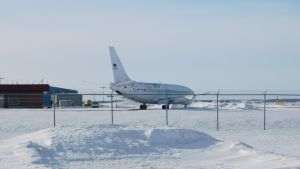Reporter: Sierra Quadrant is one of the most important players in the consulting services market in Romania. What essentially defines your offer, your services?
Florin Dragomir: Sierra Quadrant essentially means experience, expertise and, of course, results. We have been on the business consulting market since 1998, and one of the founders, an American citizen, represented an American investment fund with the same name. It's been 26 years since we've been offering integrated business consulting, reorganization and restructuring services. We have developed hundreds of restructuring plans, refloating companies in almost every field, from construction to trade, services and high-end industries. We have been able to save many companies on the brink of bankruptcy, securing jobs and leveraging billions in assets.
Reporter: What expectations do you have regarding the evolution of the insolvency market in the next period?
Florin Dragomir: Unfortunately, we are going through a period full of economic, fiscal, political and social challenges. There are multiple effects, on all levels, from industrial production to population consumption, from fiscal uncertainty to the investment dimension.
In all this context, we try to anticipate the economic effects, to develop studies, market analyses, to discuss with the specialists in the field in an attempt to monitor, understand and anticipate the economic trends and the effects on the Romanian business.
In recent years, the economy has gone through an unprecedented situation - the pandemic with restrictive measures, inflation, war, fiscal measures, all influenced reality in less than 3 years. For many of the firms, especially small and medium-sized companies, the challenges have been huge and insolvency is more than imminent.
Reporter: This should be good news for practitioners.
Florin Dragomir: It's not that simple. We are here to help companies, for better or for worse, primarily to overcome difficult times.
After all, we have two alternative objectives in the mandate received, namely the recovery of the company in the case of judicial restructuring/reorganization or the capitalization of the assets within a reasonable period in the case of bankruptcy.
The financial crisis of 2008 showed us that economic uncertainty decreases the interest of investors and implicitly the demand in the economy, and the costs of insolvency increase significantly.
Reporter: Are pre-insolvency proceedings a viable alternative? How has Sierra Quadrant adapted its offering to the new legislative framework?
Florin Dragomir: Clearly yes, the current legislative framework brings some essential clarifications, and judicial practice is now taking shape. It will take several years for good practice solutions to crystallize.
Our main asset is our human resource. We have colleagues with different specialties, over 25 years of experience in consulting and insolvency, and we are ready to assist companies in difficulty. Our main concern is to inform managers aware of the problems of their own business that prevention is absolutely essential and that the associated measures are all the more effective the earlier they are taken, with the help of specialists. That is why we are always looking for solutions for direct communication with entrepreneurs, with those who feel the need for expertise.
Reporter: How do you convey your message to entrepreneurs?
Florin Dragomir: Communication on several levels is the only solution for the consultant of "distressed" companies. Participation in conferences and meetings with business people, publication of own opinions and studies trades made by our experts, our web platform, active presence in social media, collaboration with mass media, how are you are the main coordinates of an integrated communication campaign, designed to offer expertise but also entrepreneurial education.
• Cross-border insolvency proceedings - the new challenge for practitioners
Reporter: Are there still challenges in insolvency after so many years of experience?
Florin Dragomir: The economy is a living organism that changes all the time. Especially our economy, which is in a permanent evolution. In other words, we are constantly faced with challenges, both of a practical and legal nature, along with the evolution of doctrine and practice. The newest and most extensive challenge is the management of a cross-border insolvency procedure, where the main procedure is in Romania and the secondary one is in Germany.
Reporter: How is such a procedure carried out?
Florin Dragomir: It is a procedure that requires cooperation between Romanian and foreign courts, and especially between Romanian and German practitioners, to an extent that allows the efficient administration of the procedures, in the interest of creditors. Cooperation mainly aims at the coordination, administration, capitalization and supervision of the debtor's assets and activities, by the Romanian representative together with the foreign representative, the goal being the satisfaction of the creditors from both procedures.
It is necessary to know the European legislation regarding the cross-border procedure, including the internal legislation of the state where the second procedure was opened, and it is mandatory that the Romanian representative has the experience and the financial and technical means to exercise his duties effectively. It is a large project, full of challenges, where the experience of our team speaks for itself. It is an important step for us in terms of developing our services.
Reporter: Is communication a problem?
Florin Dragomir: Beyond the linguistic challenges, there are significant differences both in the specific legislation and in the method of application. From the analysis of the activity reports of the German practitioner, I realized how little formal they are, hence the conclusion that the profession is highly respected in Western Europe.
Reporter: The most well-known case in the media of cross-border restructuring is the restructuring requested by the Blue Air company in Italy, in addition to the procedure carried out in Romania. Are there other such cases that could be brought to the public's attention? Why did the respective companies resort to this type of restructuring? What are the particularities of such a restructuring?
Florin Dragomir: In the case of Blue Air, according to our knowledge, we are talking about the preventive arrangement, opened in Romania and later opened in Italy, meanwhile failed in the insolvency procedure. Cross-border restructuring is required in the case of companies with "headquarters" in other EU countries than the one in which it has its "center of main interests". It is difficult to find out how many such cases there are at the level of the European Union because, unlike insolvency, restructuring is mostly carried out outside the court and they are more or less confidential. The application of EU Regulation 2015/48 on insolvency proceedings is essential, at least as regards the determination of the competent court to open an insolvency proceeding and the applicable national legislation.
Reporter: What are the differences between common-law restructuring and cross-border restructuring? Is it easier to use procedures like work-out and pre-pack? How to preserve fair treatment for creditors of the same company?
Florin Dragomir: Although we have our own analysis department, we are still a company of practitioners and we leave the comparative right to doctrine and analysts. We understand that the proposal for the Directive on the standardization of certain aspects regarding insolvency tries to bring the pre-insolvency and insolvency rules in the EU closer to those in the Anglo-Saxon system, first of all to the American one, and there are some famous cases where this transfer procedure was successful and led to saving the business itself. This is precisely the purpose of the Directive proposal, that the "pre-pack" transfer be monitored and transparent, respecting the interests of the creditors.
Reporter: In this type of restructuring, what happens in case of division? What happens to the obligations, to the debts assumed at the level of the whole company in case of a cross-border division?
Florin Dragomir: The division, as well as the merger of a company within a restructuring procedure (such as the preventive arrangement) is also subject to special rules in the matter, in the case of Romania speaking of law 31/1990, which also transposes a directive European. Concretely, the "pre-insolvency" restructuring allows the division, as a measure of the restructuring plan, but will have to be respected and and the provisions of the legislation in the matter of the law of commercial companies from all the states involved. Also through the restructuring plan, the intentions of the "distressed" company will be brought to the attention of the creditors regarding the distribution of historical debts in the framework of the division.
Reporter: Thank you.
























































